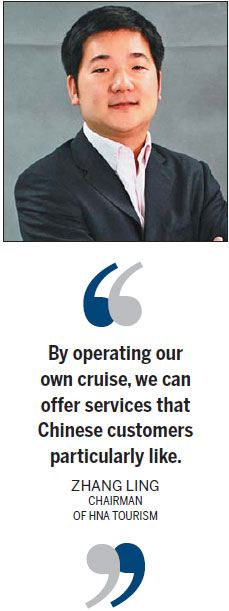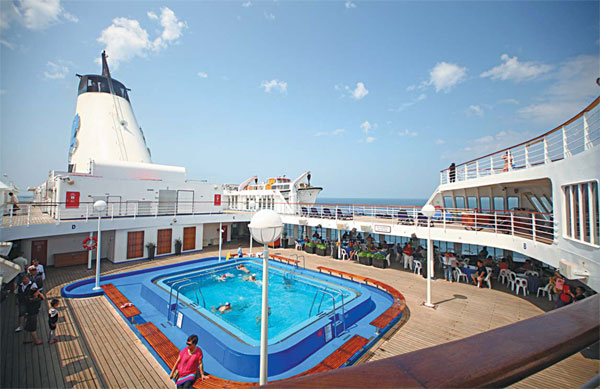Hotel deal expands travel options
Updated: 2014-11-28 10:47
By Wang Chao and Joseph Catanzaro(China Daily Europe)
|
|||||||||||
Tour operator spends big on enlarging its net in Europe
Spanish hotel group NH recently got a Chinese parent. Hainan-based HNA Group increased its stake in the hotel group to 29.5 percent, becoming the biggest shareholder. These hotels will provide rooms for HNA Group's subsidiary company HNA Tourism Group. NH group operates more than 380 hotels in 26 countries, with more than 60,000 rooms.
Established in Beijing in 2007, HNA Tourism operates in more than 20 countries in Europe, America and Asia, serving around 1.6 million tourists last year.
Under the tutelage of its parent company HNA Group which operates air transportation, real estate, retailing, financial services, tourism and logistics, HNA Tourism has quickly grown into a tourism service conglomerate operating airlines, cruises, financing platforms and hotels.
The brands it operates include Capital Airlines, Deer Jet, Caissa, and HNA Cruises, Hong Thai Travel Services and Tangla Hotel.
The China Tourism Academy says there are 10,000 travel agencies in China, very few of which own their own hotels or airlines. For most Chinese airlines, the only conduit to tourism-related business such as hotels and tours is HNA.
HNA Tourism is ranked No 6 on the list of top 20 Chinese tourism group, the third consecutive year that it has been on the list, the China Tourism Academy says.
Last month it was awarded as Asia's Leading Travel Management Company and China's Leading Travel Management Company for 2014, by the World Travel Awards.
Zhang Ling, chairman of HNA Tourism, says Europe is a strategic market for HNA and the company will seize the business opportunities coming with the influx of Chinese tourists.
Now more and more Chinese are investing in Europe, and high-end hotel services have great potential, experts say. Although some European brands have been promoting their Chinese-friendly services, none offer dedicated services for Chinese high-end customers.
Apart from cooperating with NH hotels, HNA Tourism is also building a Chinese hotel brand, the Tangla, serving premium Chinese travelers.
Yang Jianhong, vice-chairman and CEO of HNA Tourism, says a Chinese hotel definitely knows more about Chinese customers' needs, and the authentic Chinese feeling can also attract more Western customers.
The first Tangla hotel opened in 2009, and there are now 10 in China and abroad, including in New York and Brussels. The company says it plans to open another 10 worldwide soon.
In 2011, HNA Tourism signed an agreement with China National Tourism Administration to accelerate the international expansion of HNA, and by then the group had decided to use acquisition as a key way to expanding.
Even as many tourism groups have been divesting themselves of properties, HNA Tourism has been on a spending spree. It vaunts a seamless service network including online booking, accommodation and online payments.
The group now has holdings in Hong Thai Travel Services, Aberdeen Tours in the US and Caissa Touristic of AG.
In June, HNA Tourism's assets were worth 110 billion yuan ($17.9 billion, 14.4 billion euros), and revenue in the first half of the year was 15.6 billion yuan.
"With hotels and airlines under the same umbrella, HNA Tourism can offer lower prices, including cheaper packages for customers traveling to Europe," Zhang says.
Internationalization not only means taking Chinese tourists overseas, but also working with local tourism groups, "so HNA Tourism has better visibility in the local market", he says.
In 2012, HNA Group bought 48 percent of the French airline Aigle Azur and became its second-largest stakeholder. Aigle Azur operates 12 aircraft in France and Algeria and carried 1.8 million passengers in 2011.
"France is a major tourism destination for Chinese tourists, and by buying a stake in the company we have better coverage and visibility in France," the company says.
Earlier this year, Hainan Airlines opened a route from Hangzhou to Paris. This is the fifth route to Europe that HNA operates after it launched flights to Moscow, St. Petersburg, Brussels and Berlin.
Caissa Touristic spearheads HNA Tourism's European expansion. Last year Caissa China's tourism products to Europe accounted for 17 percent of the total in China.
Every year after the National Day holidays in October, China's outbound travel market goes sloppy, usually until the end of the year. To get more cash flow during this period, Caissa launches various budget travel packages together with local tourism bureaus in Europe and the US.
"There are three major elements in a tourism company: travel agencies, flights and hotels," Zhang says. "After we bought Caissa in 2011 our agencies became stronger. Caissa is a Germany-based company and has valuable assets in Europe, which is good way for us to enter the European market."
The European tour agency also works as a barometer of airlines. When the agency shows that travel intentions are ebbing, the airline can reduce fares to attract more customers, and when demand returns, they can be put up.
Like many other traditional industries, HNA Tourism is trying hard to catch up with the pace of e-commerce.
Yang says: "People may think having a business online is much cheaper than renting offices for tour agencies, but actually it costs a lot more to do advertising so people will log on to your website and buy your products. We are also struggling to find a better business model online."
Niche marketing has become important, he says. HNA Tourism has invested a total of 1 billion yuan to develop online products such as on-line booking and has managed to attract many tourists in off-peak periods. It is also developing a market for sports aficionados who want to travel abroad to attend big events.
Luxury cruises have also become popular. HNA Cruise has become the Chinese tourism company to own a cruise ship, called Henna, which sails relatively short distances, between Sanya and Vietnam, Tianjin and Japan, Shanghai and Taiwan and Haikou and Vietnam.
The cruise company employs more than 700 crewmembers from 22 countries.
Zhang says he hopes cruise can eventually sail further afield, like Europe.
"We will also launch coastline sightseeing and rehabilitating services. By operating our own cruise, we can offer services that Chinese customers particularly like."
One observation of industry insiders is that unlike Western cruise customers who love lying on the deck lapping up sunshine, many Chinese travelers follow a decidedly Chinese pursuit they gather to play Mahjong.
With more Chinese tourists traveling abroad, tourism companies have to respect customers' demands, the company says.
Contact the writers through wangchao@chinadaily.com.cn

|
The luxury ship Henna owned by HNA Tourism offers services that meet Chinese tourists' demands. Photos Provided to China Daily |
(China Daily European Weekly 11/28/2014 page8)
Today's Top News
UK brothers jailed for attending terror camp
British couple arrested on suspicion of Syria-related 'terror offences'
Lang Lang wins Spanish music award
More help sought to get fugitives back
Soccer to become required course in China's schools
E-commerce retailers' service for Black Friday
Star bucks compromise quality?
Nation mulls end of death penalty for some crimes
Hot Topics
Lunar probe , China growth forecasts, Emission rules get tougher, China seen through 'colored lens', International board,
Editor's Picks

|

|

|

|

|

|






